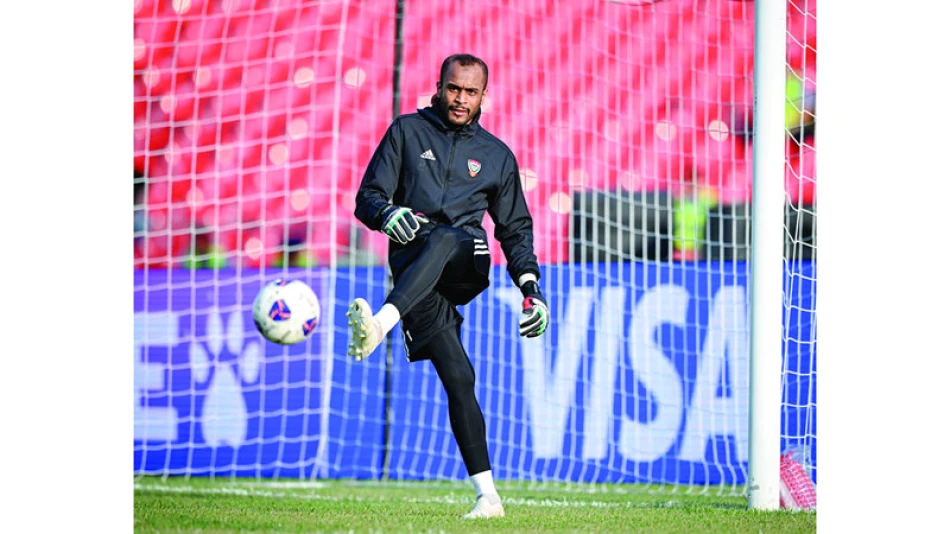
UAE National Team's Crucial World Cup Qualifier: Two Steps Away from Glory, Mission Achievable
UAE's World Cup Dreams Hang in the Balance as Goalkeeper Calls Playoff Mission "Not Impossible"
The UAE national football team faces its most crucial test in decades as goalkeeper and captain Ali Khaseef declares the nation's World Cup 2026 qualification bid against Oman and Qatar "not impossible." With just two matches standing between the Emirates and their first World Cup appearance since 1990, the pressure is mounting on a squad that has been methodically preparing for what could be a historic breakthrough in Emirati football.
High Stakes, Higher Expectations
Speaking to media during the team's training camp in Dubai, Khaseef emphasized the clarity of purpose within the squad. "Our goal as players is clear – to qualify for the World Cup," he stated, reflecting the focused mentality that has characterized the UAE's approach under coach Olario Cosmin.
The upcoming playoff matches represent more than just qualification opportunities; they symbolize the UAE's broader sporting ambitions as the nation continues to establish itself as a regional powerhouse. A successful campaign would mark the country's return to football's biggest stage after a 36-year absence, potentially rivaling the regional success stories of Qatar's 2022 hosting triumph and Saudi Arabia's recent World Cup performances.
Strategic Preparation Under Cosmin's Leadership
Tactical Evolution
The Romanian coach has been implementing a comprehensive preparation strategy that began with a training camp in Austria in July, where the team faced Italian side Lecce and Slovenian club Bravo. This European exposure reflects a growing trend among Gulf nations to seek high-level preparation abroad, similar to Saudi Arabia's extensive international friendlies program.
Currently training at the Dubai Police Officers Club, Cosmin is focusing on physical conditioning, technical skills, and tactical organization. The coach's deep knowledge of the UAE domestic league has proven invaluable in identifying and integrating talent, creating what Khaseef describes as an effective blend of experienced players and emerging youth.
Squad Dynamics and Team Chemistry
Khaseef highlighted the natural chemistry within the squad, noting that many players know each other well through the UAE Pro League. This domestic familiarity could prove crucial in high-pressure playoff situations, where understanding and trust between teammates often determine outcomes.
The captain's confidence in his teammates' readiness suggests a squad that has moved beyond individual talent to collective purpose – a transformation that historically separates successful World Cup qualifiers from near-misses.
Regional Context and Competitive Landscape
The UAE's playoff opponents present distinct challenges. Qatar, as defending Asian champions and recent World Cup hosts, brings tournament experience and tactical sophistication. Oman, meanwhile, has consistently punched above its weight in regional competitions, making them dangerous underdogs.
This scenario mirrors other recent Asian playoff battles where smaller nations have surprised established powers. The UAE's approach – combining systematic preparation with experienced leadership – follows the blueprint that has seen countries like Australia and South Korea maintain consistent World Cup qualification over multiple cycles.
Fan Support as the X-Factor
Khaseef's message to UAE supporters was telling: he expects them to naturally rally behind the team without needing encouragement. This confidence in fan support reflects the growing football culture in the Emirates, where success at club level in continental competitions has raised expectations for national team performance.
The goalkeeper's emphasis on crowd influence acknowledges a crucial factor that could determine playoff outcomes. Home advantage in qualification matches has proven decisive throughout World Cup history, and the UAE will need every possible edge against quality opposition.
Economic and Sporting Implications
World Cup qualification would deliver significant economic benefits beyond football. The UAE's sports tourism sector, already bolstered by hosting major events, would gain additional momentum from World Cup participation. For a nation investing heavily in sports infrastructure and youth development, qualification would validate long-term strategic planning.
From a regional perspective, UAE qualification would further establish the Gulf as a rising force in international football, following Qatar's World Cup hosting and Saudi Arabia's ambitious sports transformation under Vision 2030.
The October playoffs represent more than qualification matches – they're a test of the UAE's sporting evolution and regional ambitions. With experienced leadership, systematic preparation, and clear objectives, the Emirates appears better positioned than ever to end its World Cup drought and announce its arrival as a consistent force in Asian football.
Most Viewed News

 Sara Khaled
Sara Khaled






